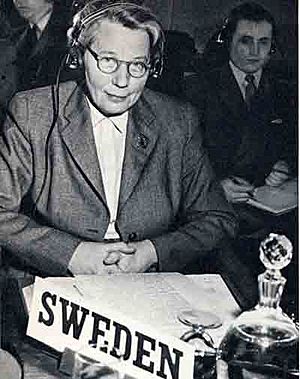Karin Kock-Lindberg facts for kids
Quick facts for kids
Karin Kock-Lindberg
|
|
|---|---|

|
|
| Minister of Supply | |
| In office 1948–1949 |
|
| Preceded by | Gunnar Sträng |
| Succeeded by | John Ericsson |
| Personal details | |
| Born | 2 July 1891 Stockholm, Sweden |
| Died | 28 July 1976 (aged 85) Stockholm, Sweden |
| Political party | Social Democrats |
Karin Kock-Lindberg (born Kock; 2 July 1891 – 28 July 1976) was a pioneering Swedish politician and a professor of economics. She made history in 1947 by becoming the first woman to hold a ministerial position in Sweden. This means she was the first woman to be a government minister! She was also the first female professor of economics in Sweden. Karin Kock became known as Karin Kock-Lindberg after she married lawyer Hugo Lindberg in 1936.
Contents
Karin Kock-Lindberg: A Trailblazer in Sweden
Karin Kock-Lindberg was a remarkable woman who broke barriers in Swedish politics and academia. She showed that women could hold important leadership roles. Her work helped shape Sweden's economy and government.
Early Life and Education
Karin Kock was born in Stockholm, Sweden, on July 2, 1891. She was very dedicated to her studies. She attended the London School of Economics in England. She also studied at Stockholm University in Sweden. Her hard work in school prepared her for a brilliant career.
A Career of Firsts
Karin Kock started her teaching career at Stockholm University. She was a lecturer there from 1933 to 1938. In 1945, she was officially named a professor of economics. This made her the first woman in Sweden to become an economics professor. She had already been working in that role for several years before her official appointment.
She wrote many important books about economics. Her special interests were in how money moves around (credit) and how economies grow and shrink (trade cycle problems). Some of her books included A Study of Interest Rates (1929) and International Trade and the GATT (1969). She also co-wrote The National Income of Sweden 1861-1930 (1937).
Serving Her Country
Karin Kock took on many important roles for the Swedish government. In 1936, she became an economic adviser for the Women's Workers Association. She also represented Sweden at an international conference in Paris in 1945.
Her biggest achievement came in 1947. She was appointed as a minister in the government. This made her the very first woman to hold a ministerial position in Sweden. She served as a minister without a specific department (called a minister without portfolio) from 1947 to 1948. Then, from 1948 to 1949, she was the Minister of Supply. This role involved managing important resources for the country.
Leading Statistics Sweden
After the Ministry of Supply closed in 1950, Karin Kock took on a new leadership role. She became the director of Statistics Sweden. This is the official agency that collects and provides statistics about Sweden. She led this important agency from 1950 to 1957.
During her time there, she also became the chairman of the Swedish Statistical Society. This happened in 1953 and 1954. Her expertise was recognized internationally too. She became a fellow of the American Statistical Association in 1956. In 1958, she became a member of the International Statistical Institute.
Karin Kock also led Sweden's group to the United Nations Economic Commission for Europe. For several years, she was the chairman of their main meetings in Geneva.
Supporting Women in Academia
Beyond her government and economic work, Karin Kock was a strong supporter of women's education. She was the chairperson of Akademiskt bildade kvinnors förening (The Association of Female Academicians) from 1926 to 1933. She also served as the vice president of the International Federation of University Women. She worked hard to help other women achieve their academic goals.
See also
- Olivia Nordgren
- Kerstin Hesselgren

